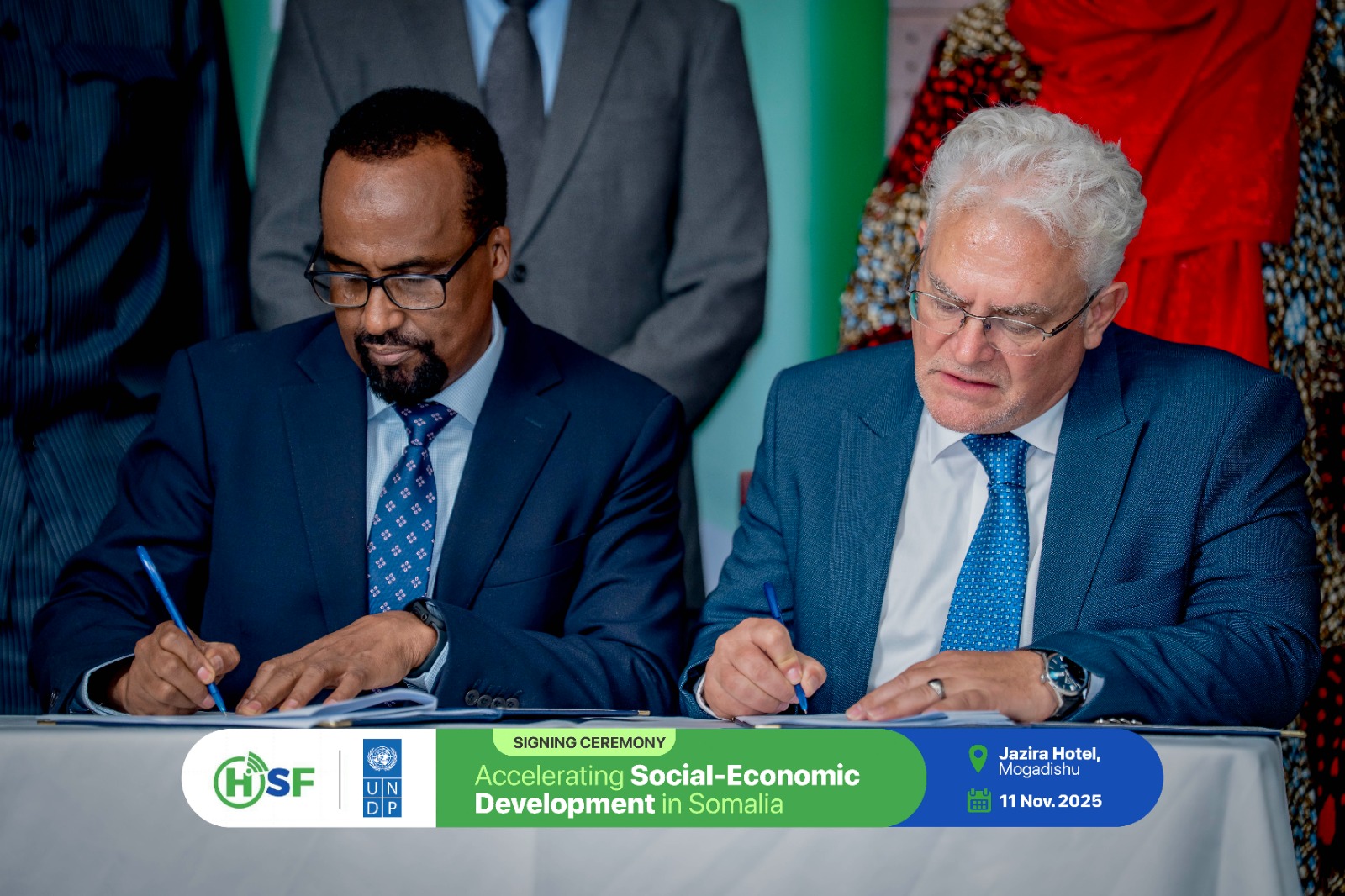UNDP and Hormuud Salaam Foundation Launch Partnership to Create Jobs in Somalia’s Green and Blue Economy

GOOBJOOG NEWS|MOGADISHU: Hormuud Salaam Foundation (HSF) and the United Nations Development Programme (UNDP) have launched a new initiative aimed at addressing youth unemployment and promoting sustainable growth through Somalia’s emerging green and blue economy.
The 18-month programme, supported by Hormuud Telecom and Salaam Somali Bank and funded with $820,000, seeks to empower more than 2,000 young people and 360 small and medium-sized enterprises (SMEs) across the country, with at least half of the beneficiaries being women or female-led enterprises.
The launch event in Mogadishu was witnessed by Deputy Prime Minister Jibril Haji Abdi, alongside the Minister of Youth and Sports and the Deputy Minister of Labour and Social Affairs.
“Today, we launched a socio-economic development project in Somalia to strengthen the business environment, boost youth employability, and drive digitalization,” said Deputy Prime Minister Jibril.
“This initiative shows how government, businesses, and international partners can unite for a common goal. I commend the partnership between UNDP and the Hormuud Salaam Foundation for blending local innovation with global expertise.”
According to UNDP, the initiative aims to create a sustainable model for inclusive economic growth by strengthening small businesses, improving access to finance, and supporting job creation in key sectors such as renewable energy, fisheries, and digital enterprise.
Key components of the programme include:
• Shaqo-Abuur(creating jobs), a digital employment platform connecting youth to verified job opportunities, mentorship, and training.
• An Innovation Lab for testing new business models in renewable energy, aquaculture, and waste management.
• Business incubator and accelerator programmes offering training on marketing, finance, and business management.
• Sharia-compliant microloans and seed funding through Salaam Somali Bank to support green and blue startups.
• A digital investment platform to attract local and diaspora investors.
• Skills development initiatives targeting youth, women, displaced persons, and people with disabilities.
• Regulatory reforms to simplify business registration and create a more transparent investment climate.
Describing the initiative as a “landmark in public–private collaboration,” Lionel Laurens, UNDP Resident Representative in Somalia, said:
“With Hormuud Salaam Foundation providing financial backing, Hormuud Telecom driving digital innovation, and Salaam Somali Bank facilitating Islamic finance, this partnership is a powerful example of Somali-led development.”
Somalia faces one of the highest youth unemployment rates globally, estimated at 67 percent, while over 75 percent of its population is under 30.
The private sector already accounts for about 95 percent of all jobs, but most enterprises remain informal and lack access to capital.
Women, who make up around 60 percent of small business owners, continue to face barriers to formalization and credit access. The new partnership aims to bridge that gap, helping youth and women entrepreneurs gain the tools, networks, and financial support needed to succeed.
Abdullahi Osman, CEO of Hormuud Salaam Foundation, emphasized the transformative potential of the initiative:
“In every corner of Somalia, you meet young people with ideas ready to take off – from a small shopkeeper in Baidoa to a coder in Mogadishu.
They don’t need charity; they need a fair chance. This partnership gives them that the skills, capital, and confidence to build something lasting.”
The programme aligns with Somalia’s National Transformation Plan (2025–2029) and Vision 2060, both of which prioritize sustainable development, digital innovation, and economic self-reliance.
With over 3,300 kilometers of coastline and vast renewable energy potential, Somalia is seen as well-positioned to leverage its natural and digital assets for growth.
The UNDP–HSF partnership aims to convert that potential into livelihoods by supporting micro, small, and medium enterprises (MSMEs) in high-impact sectors.
Ultimately, the initiative underscores a broader shift toward locally led, inclusive, and sustainable development in Somalia — empowering young people, women, and entrepreneurs to drive the country’s recovery and resilience.